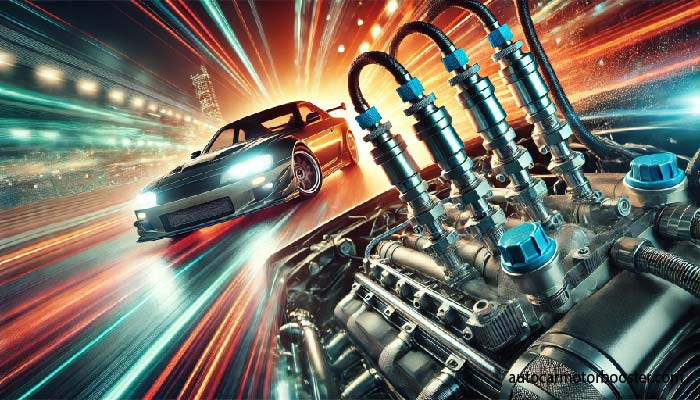When it comes to enhancing the performance of boosted cars, selecting the right fuel injector is crucial. Fuel injectors play a vital role in delivering the correct amount of fuel to the engine, ensuring optimal combustion and performance. In this article, we will explore the various fuel injector options available for boosted vehicles, helping you make an informed decision.
Understanding Fuel Injectors
Fuel injectors are electronic components that spray fuel into the engine’s intake manifold or combustion chamber. The precision of fuel delivery impacts power output, fuel efficiency, and emissions. For boosted engines, which often operate at higher pressures and temperatures, the choice of fuel injector becomes even more significant.
Types of Fuel Injectors
- Port Fuel Injectors
- Description: These injectors deliver fuel directly into the intake manifold, allowing for better atomization and mixing with air.
- Best For: Naturally aspirated engines and moderate boost applications.
- Direct Fuel Injectors
- Description: Direct injectors spray fuel directly into the combustion chamber under high pressure.
- Best For: Turbocharged and supercharged engines, as they can handle higher pressures and provide better fuel efficiency.
- High-Flow Fuel Injectors
- Description: These injectors can deliver a larger volume of fuel, essential for high-performance applications.
- Best For: Race cars or heavily modified street cars that require additional fuel to support increased horsepower.
- Multi-Point Fuel Injectors
- Description: These injectors work in tandem to provide precise fuel delivery at multiple points in the combustion cycle.
- Best For: Advanced tuning applications where performance optimization is critical.
Choosing the Right Injector Size
When selecting a fuel injector, size matters. The injector size is typically measured in pounds per hour (lb/hr) or cubic centimeters per minute (cc/min). Here are some factors to consider when determining the appropriate size for your boosted vehicle:
- Power Goals: Estimate your engine’s horsepower to determine the fuel flow requirements. A general rule is that for every 100 horsepower, you need approximately 10 lb/hr of injector capacity.
- Fuel Type: Different fuels have varying energy content. For instance, gasoline requires less fuel flow than ethanol or methanol for the same power output. Adjust your calculations based on the fuel type used.
- Engine Efficiency: More efficient engines may require smaller injectors, while less efficient engines may need larger ones to achieve the same performance levels.
Top Brands for Fuel Injectors
Several brands are renowned for their quality fuel injectors in the performance market. Here are a few to consider:
- Bosch: Known for reliability and precision, Bosch injectors are a popular choice for both OEM and aftermarket applications.
- DeatschWerks: Specializing in high-flow injectors, DeatschWerks offers options tailored for modified engines.
- Injector Dynamics: Focused on providing high-performance injectors, Injector Dynamics is well-regarded among enthusiasts.
- Siemens Deka: Siemens Deka injectors are known for their consistency and ability to handle high pressures, making them suitable for boosted applications.
Tuning and Calibration
Once you’ve chosen the right fuel injectors, tuning and calibration are essential for maximizing performance. Aftermarket tuning solutions can help optimize the fuel-to-air ratio, ensuring your engine runs efficiently and reliably. Proper tuning helps prevent issues like lean conditions, which can lead to engine damage.
Maintenance Tips for Fuel Injectors
To ensure the longevity and performance of your fuel injectors, consider the following maintenance tips:
- Regular Cleaning: Use fuel injector cleaners periodically to prevent clogs and deposits.
- Check for Leaks: Regularly inspect your fuel system for leaks that can affect performance.
- Monitor Fuel Quality: Using high-quality fuel can prevent injector fouling and improve performance.
Conclusion
Choosing the right fuel injectors is vital for optimizing the performance of boosted cars. By understanding the different types, sizing considerations, and maintenance practices, you can ensure your vehicle runs at its best. Always remember that proper tuning is equally important to maximize the potential of your chosen injectors. With the right choices, your boosted vehicle can achieve impressive power and efficiency.
FAQs
1. What are the signs that my fuel injectors need to be replaced?
Signs include rough idling, decreased fuel efficiency, and engine misfires.
2. Can I use larger injectors than my engine requires?
Yes, but it’s crucial to tune the engine properly to avoid running too rich, which can damage the engine.
3. How often should I clean my fuel injectors?
It’s recommended to clean them every 30,000 miles, or more frequently if you use low-quality fuel.
4. Do I need to retune my car after replacing fuel injectors?
Yes, retuning is essential to adjust the fuel mapping and ensure optimal performance.
5. Are aftermarket fuel injectors reliable?
Many aftermarket options are reliable, but it’s important to choose reputable brands and have them properly installed and tuned.
If Like This Article Visit Our Website. Collect From Wekiapedia
